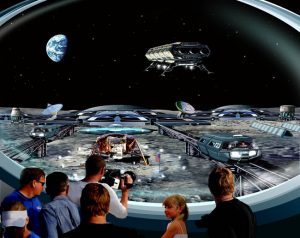Lunar tourism may still sound like an unrealistic idea but it may become a reality in the future, given the advancements in space technology.

Trips to the moon made available to a private audience have only been proposed by several companies. Some have even started accepting bookings.
Many space tourism start-up companies are planning to offer tours on or around the Moon. Moreover, they have estimated to execute their offers sometime between 2023 and 2043.
According to experts, tourist flights would be of three types: flyby in a circumlunar trajectory, lunar orbit, and lunar landing. Few companies have also declared their cost for tourists who will travel to the moon.
While private moon travel still remains a bridge too far, some visionaries have already started looking at moon hospitality. The project, dubbed ‘The Glass’, is being planned by Kyoto University and Kajima Corporation. CGI photos of their proposal for the earth-like city with artificial gravity have now surfaced online.
The so-called Lunar City will be a rotating building. Moreover, it will complete a full circle every 20 seconds, according to a Mirror report.
The project is being planned
The project is being planned by Kyoto University and Kajima Corporation. CGI photos of their proposal for the earth-like city with artificial gravity have now surfaced online.
Professor Yamashiki has worked with Kajima Corporation, which built Japan’s first ultra-high-rise buildings in the 1960s.”NASA has positioned low gravity as a key issue for human life in space,” said Project leader Professor Yosuke Yamashiki, of Kyoto University. The Glass would have its own ecosystem with plants, trees, and water. It would also have an artificial gravity transportation system, something that is called ‘Hexatrack’.

“By living in the facility, human beings will be able to have children without anxiety and maintain a physical condition that allows them to return to Earth at any time,” said Professor Yamashiki.
The company plans to come up with a prototype of The Glass on the lunar surface. It will be ready within the next three decades.
“Humanity is now moving from the era of ‘staying’ in space to the era of ‘living’ on the Moon and Mars,” said Prof Yamashiki.











